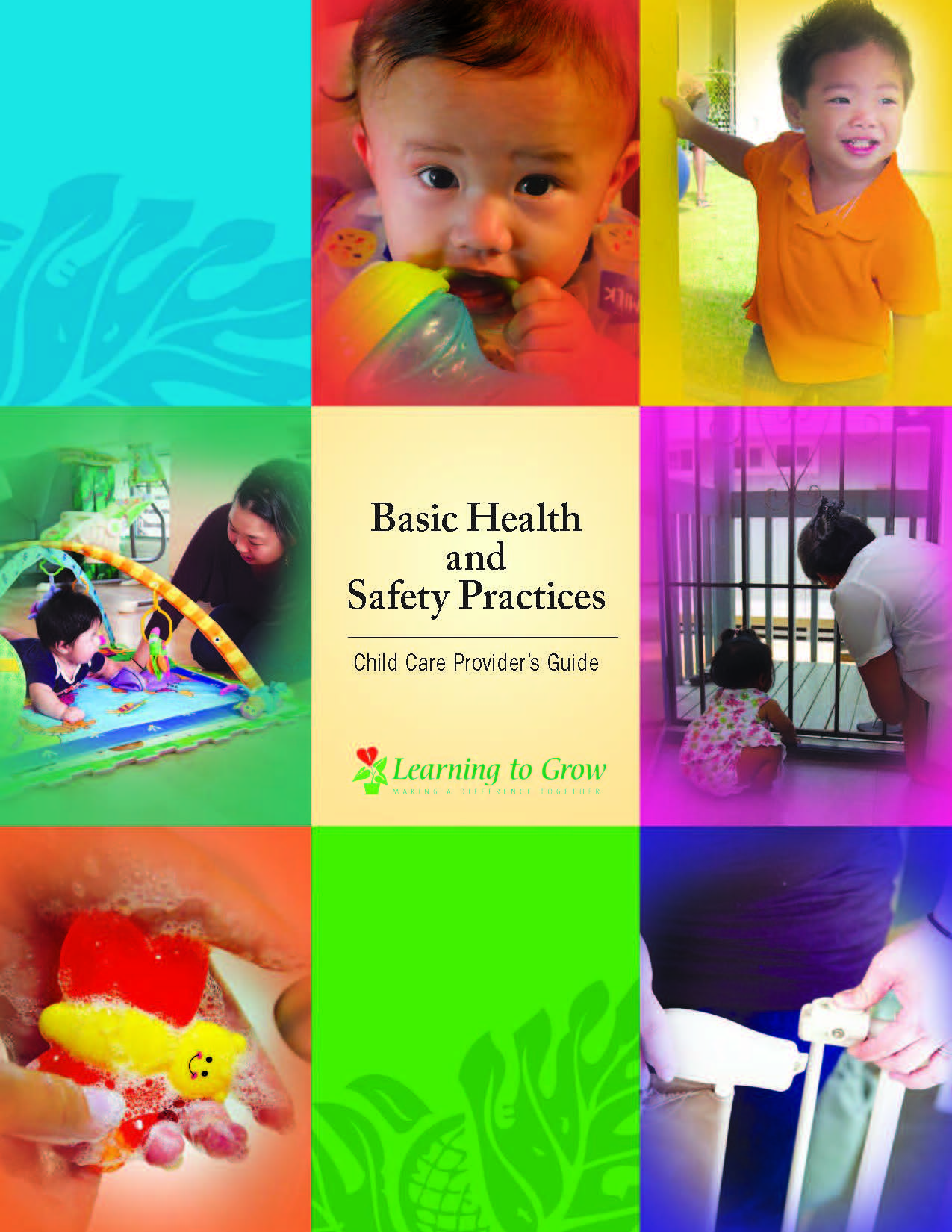PDF Connect with Love Languages View
|

In this newsletter, we will introduce the 5 love languages and strategies to use them to connect with infants, toddlers, and preschoolers as a way to individualize your care and response to your child.
FACEBOOK SHARE ICON.
|
PDF 4 E's to Spark Your Child's Interest (Nov 2021 newsletter) View
|

In this newsletter, we will present additional ideas for using the 4 E’s with each age level -- infants, toddlers and preschoolers. By using the 4 E’s, your child will not only learn more about the subject of her interest, but she will also discover that learning is fun!
FACEBOOK SHARE ICON.
|
PDF Active Play for Learning (Jan 2023 Newsletter) View
|

This newsletter will discuss ways to support children’s vestibular system development at each age level — infants, toddlers and preschoolers, and present active play movement ideas for each age group.
FACEBOOK SHARE ICON.
|
PDF Active Play for Learning (Jan 2023 QCC Newsletter) View
|

This newsletter will discuss ways to support children's vestibular system development at each age level - infants, toddlers and preschoolers, and present active play movement ideas for each age group.
FACEBOOK SHARE ICON.
|
PDF Active Supervision - April 2019 Newsletter View
|

In this newsletter, we have included strategies to help put active supervision in place as well as tips for supervising fun activities with infants, toddlers, and preschoolers.
FACEBOOK SHARE ICON.
|
PDF Active Supervision - April 2019 QCC Newsletter View
|

In this newsletter, we will discuss these active supervision strategies and have included additional tips to keep infants, toddlers, and preschoolers safe.
FACEBOOK SHARE ICON.
|
PDF Addressing Challenging Child Behaviors - QCC Newsletter View
|

In this newsletter, we will discuss an approach that helps you engage the family to jointly address the child’s behavior by: documenting occurrences over a period of time, scheduling a conference to have a non-judgmental discussion with the family, agreeing to a shared behavior modification plan, and continuing to discuss the child’s progress.
FACEBOOK SHARE ICON.
|
PDF Affordable Art Ideas View
|

In this newsletter, we will introduce some simple and affordable art activities that you can do with your infant, toddler, and preschooler.
FACEBOOK SHARE ICON.
|
PDF All in the ‘Ohana View
|

This newsletter will highlight four key elements to keep in mind when working with diverse families.
FACEBOOK SHARE ICON.
|
PDF Art Ideas for Your Program View
|
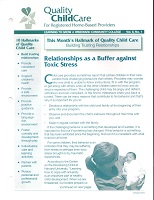
In this newsletter, we will share simple, age-appropriate and affordable art materials and activities that you can do with infants, toddlers, and preschoolers to make art accessible for all the children in your program.
FACEBOOK SHARE ICON.
|
PDF Balancing Different Perspective Volume III. No 7 View
|

This newsletter features ways to partner with families of the children in your care.
FACEBOOK SHARE ICON.
|
PDF Basic Health and Safety Practices: Child Care Provider's Guide View
|
|
|
PDF Being Ready For Each Day View
|

Raising a School-Ready Child will provide you with ideas on how to engage young children, especially 3-and 4-year olds, in everyday activities that help them develop the characteristics, positive behaviors, and skills that lead to success at home, school, work, and in life.
FACEBOOK SHARE ICON.
|
PDF Big Body Play View
|

This newsletter explores "Big Body Play", a type of active play that is physical and often rough and tumble. The benefits of such play are discussed, as are common concerns about this type of play and tips for ensuring children's safety.
FACEBOOK SHARE ICON.
|
PDF Block Play Fosters Development - QCC Newsletter View
|

In this newsletter, we will share many uses and benefits of block play for young children at different developmental stages.
FACEBOOK SHARE ICON.
|
PDF Born to Sing (March 2021 Newsletter) View
|

In this newsletter, we will discuss ways infants, toddlers and preschooler respond to singing. We will also highlight three types of engaging songs to sing with young children– lullabies, piggyback songs and playful songs.
FACEBOOK SHARE ICON.
|
PDF Born to Sing (QCC Newsletter March 2021) View
|

In this newsletter, we will share how singing helps children’s development, and highlight three types of engaging songs that providers and families can sing with infants, toddlers and preschoolers: lullabies, piggyback songs, and playful songs.
FACEBOOK SHARE ICON.
|
PDF Brain Development December 2013 Newsletter View
|

This newsletter will focus on daily interactions that you can have with your child to support their brain development.
FACEBOOK SHARE ICON.
|
PDF Build Large Muscle Activities into Everyday Routines May 2018 Newsletter View
|

In this newsletter, we will discuss how large muscle movements build children's brain at each age level and offer tips for incorporating these activities into everyday routines.
FACEBOOK SHARE ICON.
|
PDF Building a Family and School Partnership View
|

Raising a School-Ready Child will provide you with ideas on how to engage young children, especially 3-and 4-year olds, in everyday activities that help them develop the characteristics, positive behaviors, and skills that lead to success at home, school, work, and in life.
FACEBOOK SHARE ICON.
|
PDF Building a Love of Science for Your Young Child - March 2015 Newsletter View
|

This newsletter will provide tips for you to use with your infant, toddler, or preschooler, as well as suggest activities that promote scientific thinking that you can do with your child at home.
FACEBOOK SHARE ICON.
|
PDF Building a Partnership with Your Care Provider December 2012 Newsletter View
|
|
|
PDF Building Brains with Repetitive Play View
|

This newsletter discusses schema play, a type of repetitive play behavior that is important for brain development. By encouraging their repeated play activities and providing acceptable alternative play activities related to their current schemas, we grow their brain!
FACEBOOK SHARE ICON.
|
PDF Building Brains with Repetitive Play View
|
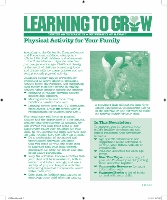
In this newsletter, we will discuss schema play, a type of repetitive play behavior that is very good for their developing brain! We will be focusing on the trajectory and scattering schemas and provide tips and suggested play activities for infants, toddlers, and preschoolers.
FACEBOOK SHARE ICON.
|
PDF Building Language and Literacy with Book Sharing - April 2018 Newsletter View
|

In this newsletter, we will offer tips for book sharing with children at each age level—infants, toddlers and preschoolers. We will also introduce, “dialogic reading,” a book sharing technique especially suitable for toddlers and preschoolers.
FACEBOOK SHARE ICON.
|
PDF Building Listening Skills - Jan 2019 QCC Newsletter View
|

This newsletter will highlight activities and discuss ways to facilitate good listening skills in your child care environment and for each age level – infants, toddlers and preschoolers.
FACEBOOK SHARE ICON.
|
PDF Building Listening Skills in Children - Jan 2019 Newsletter View
|
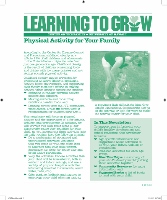
In this newsletter, we will discuss ways to promote good listening skills at each age level – infants, toddlers and preschoolers, and highlight activities that give children practice in listening.
FACEBOOK SHARE ICON.
|
PDF Building Literacy Through Dialogic Reading (June 2022 Newsletter) View
|

In this newsletter, we will offer tips for book sharing with children at each age level—infants, toddlers and preschoolers. We will also introduce dialogic reading, a book sharing technique especially suitable for toddlers and preschoolers.
FACEBOOK SHARE ICON.
|
PDF Building Literacy through Dialogic Reading (June 2022 QCC Newsletter) View
|

In this newsletter, we will offer tips for book sharing with children at each age level—infants, toddlers and preschoolers. We will also introduce dialogic reading, a book sharing technique especially suitable for toddlers and preschoolers.
FACEBOOK SHARE ICON.
|
PDF Building Resilience (Feb 2021 Newsletter) View
|

In this newsletter, we will describe what you can do to provide protective factors – events, conditions and characteristics of children, families and environments – that increase a child’s chances of healthy development and positive life outcomes despite exposure to significant adversity during these trying times.
FACEBOOK SHARE ICON.
|
PDF Building Resilience (QCC Feb 2021 Newsletter) View
|

In this newsletter we will look at some of the challenges young children might face during this pandemic, define protective factors and describe specific things you can do to provide those protective factors especially during these stressful times.
FACEBOOK SHARE ICON.
|
PDF Building Responsibility April 2014 Newsletter View
|

Newsletter that includes information to help you support your child build his/her responsibility.
FACEBOOK SHARE ICON.
|
PDF Building Self Confidence May 2023 LE Newsletter View
|

Self-confidence plays a key role in children’s lifelong success. In this newsletter, we will present examples of how you can give your child experiences to build her self-confidence at any age level – infants, toddlers and preschoolers.
FACEBOOK SHARE ICON.
|
PDF Building Self-Confidence QCC Newsletter May 2023 View
|

Self-confidence plays a key role in children’s lifelong success. In this newsletter, we will present specific examples of how you can give children experiences to build their self-confidence at each age level – infants, toddlers, and preschoolers.
FACEBOOK SHARE ICON.
|
PDF Building Support for Children's Mental Health View
|

This newsletter will feature the powerful effect that caregivers' relationships and interactions have on emotional well-being, three overarching child care practices that build strong relationships, and nine indicators of responsive caregiving.
FACEBOOK SHARE ICON.
|
PDF Building Trust with Parents of Children with Special Needs View
|
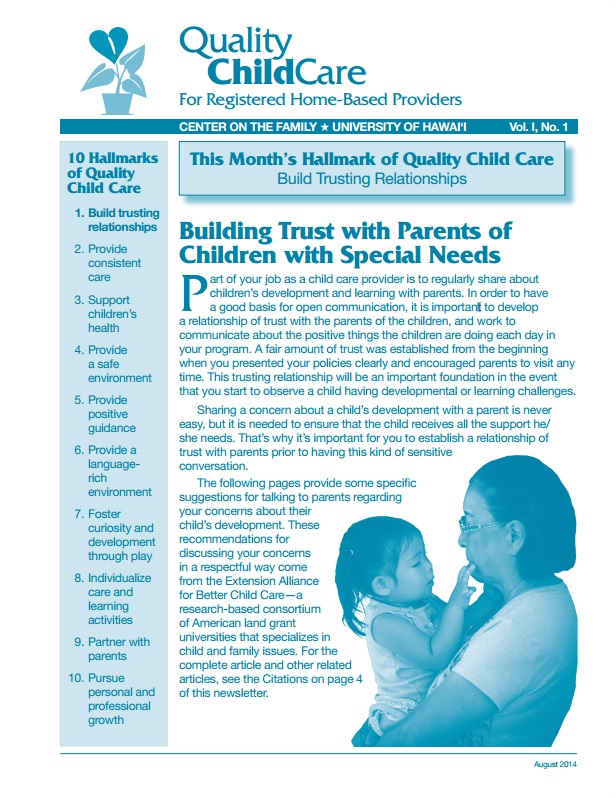
This newsletter focuses on building trusting relationships with the families of children in your care and your role in talking with families about their child's development and any special needs.
FACEBOOK SHARE ICON.
|
PDF Caring for Children Who Have Experienced Trauma (April 2020 QCC Newsletter) View
|

In this newsletter, we will discuss how trauma informed care can support children who may have experienced trauma.
FACEBOOK SHARE ICON.
|
PDF Celebrating Culture View
|

This newsletter will share strategies to help your infant, toddler, or preschooler embrace their cultural identity and explore and appreciate other cultures.
FACEBOOK SHARE ICON.
|
PDF Celebrating Culture View
|

This newsletter will share tips on how to support children in embracing their own culture and exploring other cultures through various activities and materials in your program.
FACEBOOK SHARE ICON.
|
PDF Celebrating Dual Language Learners View
|

Becoming multi-lingual is often an asset in the world today. However, it can be difficult to support young children whose home language differs from the one used in the care setting. This newsletter explores language development and the ways in which care providers can support the needs of dual language learners. Benefits and concerns about dual language exposure are addressed.
FACEBOOK SHARE ICON.
|
PDF Challenging Behaviors (December 2021 Newsletter) View
|

This newsletter presents an overview of some of the challenging behaviors you may encounter within each age group (infants, toddlers and preschoolers).
FACEBOOK SHARE ICON.
|
PDF Challenging Behaviors (QCC December 2021 Newsletter) View
|

This newsletter presents an overview of some of the challenging behaviors you may encounter within each age group (infants, toddlers and preschoolers).
FACEBOOK SHARE ICON.
|
PDF Child Care Providers' Role in Children's Oral Health - December 2015 QCC Newsletter View
|

This newsletter describes some common oral health concerns that affect young children, in particular infants and toddlers, and gives you recommendations to promote oral hygiene in your program as well as tips that you can share with families.
FACEBOOK SHARE ICON.
|
PDF Children’s Health—Their Skin Tells a Story View
|

This newsletter discusses common skin disorders, both non-contagious and contagious, and the importance of daily health checks when children arrive each day.
FACEBOOK SHARE ICON.
|
PDF Choosing Child Care Booklet View
|

The Choosing Child Care booklet provides information on child care alternatives available to families.
FACEBOOK SHARE ICON.
|
PDF Choosing Child Care Brochure View
|

The Choosing Child Care brochure provides families with information on what to look for in a quality child care provider. Various child care options are presented, as well as a step-by-step checklist that will help families with their child care decision.
FACEBOOK SHARE ICON.
|
PDF Cloth Face Coverings View
|

Children over age 2 should wear cloth face coverings when they can't stay 6 feet away from others outside their home.
FACEBOOK SHARE ICON.
|
PDF Community Contributor View
|

Raising a School-Ready Child will provide you with ideas on how to engage young children, especially 3-and 4-year olds, in everyday activities that help them develop the characteristics, positive behaviors, and skills that lead to success at home, school, work, and in life.
FACEBOOK SHARE ICON.
|
PDF Complex Thinker View
|

Raising a School-Ready Child will provide you with ideas on how to engage young children, especially 3-and 4-year olds, in everyday activities that help them develop the characteristics, positive behaviors, and skills that lead to success at home, school, work, and in life.
FACEBOOK SHARE ICON.
|
PDF Concerned About Your Child's Development? (May 2022 Newsletter) View
|

This newsletter will highlight some information about development as well as provide some information of how early intervention services could support your child. In addition, we included ideas of age-appropriate activities you may enjoy doing together.
FACEBOOK SHARE ICON.
|
PDF Connect with Love Languages View
|

In this newsletter, we will introduce the 5 love languages and ways to use them to connect with infants, toddlers, and preschoolers to individualize your care and response to each child.
FACEBOOK SHARE ICON.
|
PDF Consistent Care - the Key to Helping Children with Social Emotional Difficulties View
|

This newsletter discusses the importance of consistency of care to the development of social emotional skills in young children - especially for children who may exhibit social-emotional difficulties. Resources and tips for addressing these concerns are provided.
FACEBOOK SHARE ICON.
|
PDF Continuing Education - QCC May 2016 Newsletter View
|

This month's issue will focus on our state and national recommendations for knowledge and skills needed by those responsible for the care of young children.
FACEBOOK SHARE ICON.
|
PDF Creating a FCC Business Plan - November 2018 Newsletter View
|

In this newsletter, tips on these sometimes overlooked aspects of business planning will be shared from Tom Copeland’s book “Family Child Care Business Planning Guide.”
FACEBOOK SHARE ICON.
|
PDF Creating a Positive Meal Environment - March 2020 Newsletter View
|
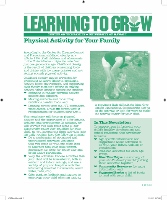
As your child grows older, responsiveness to his hunger, allowing choices toward the foods he eats, and involving him in meal preparation are ways to create a positive meal environment. This newsletter will explore these topics, as well as give age-appropriate activities for infants, toddlers, and preschoolers.
FACEBOOK SHARE ICON.
|
PDF Creating a Positive Meal Environment - March 2020 QCC Newsletter View
|
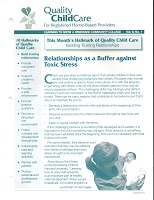
With a mixed age group in your care, there are special considerations in creating a positive meal environment for all children.This newsletter will explore this topic, as well as give age-appropriate activities for infants, toddlers, and preschoolers
FACEBOOK SHARE ICON.
|
PDF Creating Your Family Emergency Plan View
|

Do you and your keiki know what to do if an emergency warning (such as your smoke alarm) goes off? This newsletter will share how to develop a family emergency plan, giving tips on how to plan with infants, toddlers, and preschoolers in mind.
FACEBOOK SHARE ICON.
|
PDF Critical Thinking: An Important 21st Century Skill View
|
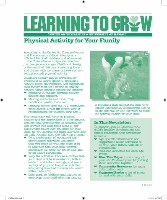
This newsletter will discuss how critical thinking develops and will provide tips and strategies for helping young children learn this skill at each age level– infants, toddlers and preschoolers.
FACEBOOK SHARE ICON.
|
PDF Critical Thinking: An Important 21st Century Skill View
|
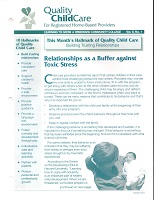
This newsletter will discuss how critical thinking develops and will provide tips and strategies for helping young children learn this skill at each age level– infants, toddlers and preschoolers.
FACEBOOK SHARE ICON.
|
PDF Daycare Dangers that Result in Insurance Claims View
|

This newsletter discusses common safety concerns that could result in injury and insurance claims. Seven common dangers are discussed and safety tips for avoiding these dangers are provided.
FACEBOOK SHARE ICON.
|
PDF Defining and Implementing Developmentally Appropriate Practices - May 2018 Newsletter View
|

In this newsletter, we'll share ideas from professional organizations as well as strategies for how to implement DAP in your program.
FACEBOOK SHARE ICON.
|
PDF Developing and Maintaining a Growth Mindset View
|

This newsletter aims to provide ideas on how to develop and maintain a growth mindset. The key ways to do this are to identify, model and practice it with your keiki.
FACEBOOK SHARE ICON.
|
PDF Developing and Maintaining a Growth Mindset View
|

This newsletter aims to provide ideas on how to develop and maintain a growth mindset for infants, toddlers, and preschoolers. The key ways to do this are to identify, model and practice it with your keiki.
FACEBOOK SHARE ICON.
|
PDF Developing Self-Control - May 2019 Newsletter View
|

This newsletter will focus on the development of self-control, and will present strategies for promoting self-control at each age level – infants, toddlers and preschoolers.
FACEBOOK SHARE ICON.
|
PDF Developing Self-Control - May 2019 QCC Newsletter View
|

This newsletter will focus on the development of self-control, and will present strategies for nurturing self-control in infants, toddlers and preschoolers.
FACEBOOK SHARE ICON.
|
PDF Developmental Milestones June 2017 View
|

This newsletter contains developmental milestones to be aware of in infancy, the toddler years, and preschool years.
FACEBOOK SHARE ICON.
|
PDF Developmental Milestones November 2013 Newsletter View
|

This newsletter contains developmental milestones to be aware of in infancy, the toddler years, and preschool years
FACEBOOK SHARE ICON.
|
PDF Discipline Techniques for Young Children - February 2016 Newsletter View
|

This newsletter will talk about ways to utilize prevention, guidance, and consequence techniques when disciplining young children. In addition, age-appropriate activities for your infant, toddler, and preschooler are given.
FACEBOOK SHARE ICON.
|
PDF Dramatic Play Supports Children's Development View
|

In this newsletter, we will share research which describes the: benefits of dramatic play, components of dramatic play, and strategies for facilitating dramatic play.
FACEBOOK SHARE ICON.
|
PDF Early Learning Exposure: Closing the 30 Million Words Gap - March 2018 Newsletter View
|

This newsletter will focus on the “Three T’s”, three steps for ensuring a language-rich environment, adapted from University of Chicago’s “Thirty Million Words Initiative.”
FACEBOOK SHARE ICON.
|
PDF Effective Communicator View
|

Raising a School-Ready Child will provide you with ideas on how to engage young children, especially 3-and 4-year olds, in everyday activities that help them develop the characteristics, positive behaviors, and skills that lead to success at home, school, work, and in life.
FACEBOOK SHARE ICON.
|
PDF Effective Ethical User of Technology View
|

Raising a School-Ready Child will provide you with ideas on how to engage young children, especially 3-and 4-year olds, in everyday activities that help them develop the characteristics, positive behaviors, and skills that lead to success at home, school, work, and in life.
FACEBOOK SHARE ICON.
|
PDF Encouraging Healthy Eating Habits - May 2014 Newsletter View
|

This newsletter will provide you with simple actions you can take to instill healthy eating habits in your child. By encouraging good eating habits now, you can make a huge impact on his healthy lifestyle in the future.
FACEBOOK SHARE ICON.
|
PDF Encouraging Healthy Eating Habits May Newsletter 2017 View
|

Forming healthy eating habits begins early. Consistently teaching your child to eat nutritiously will help his growth, development, and overall health throughout his life.
FACEBOOK SHARE ICON.
|
PDF Enhancing Learning with Music View
|

In this newsletter, we introduce ways to use songs, movement, and musical instruments in your daily routine, as well as give you activity ideas to use with infants, toddlers, and preschoolers.
FACEBOOK SHARE ICON.
|
PDF Enhancing Learning with Music View
|
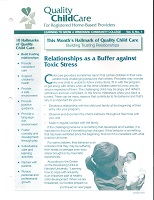
In this newsletter, we introduce ways to use songs, movement, and musical instruments in your daily routine, as well as give you activity ideas to use with infants, toddlers, and preschoolers.
FACEBOOK SHARE ICON.
|
PDF Establishing Routines to Support Healthy Emotional Development - Dec 2016 Newsletter View
|

By establishing routines you are helping your child to feel safe, loved, and cared for.
FACEBOOK SHARE ICON.
|
PDF F.O.U.R. Ways to Help Your Child Think Like a Coder View
|

In this newsletter, we will discuss F.O.U.R. ways to help children think like a coder, and present fun and engaging activities you can do with children at each age level -- infants, toddlers and preschoolers -- to help them gain important foundational thinking skills.
FACEBOOK SHARE ICON.
|
PDF F.O.U.R. Ways to Help Your Child Think Like a Coder View
|
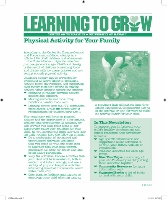
In this newsletter, we will discuss F.O.U.R. ways to help a child think like a coder, and present fun and engaging activities you can do with children at each age level -- infants, toddlers and preschoolers -- to help them gain these important foundational thinking skills.
FACEBOOK SHARE ICON.
|
PDF Family Time on a Budget View
|

This newsletter will provide you with some money-saving tips and inexpensive activities to help you stay on budget and have fun with your young child.
FACEBOOK SHARE ICON.
|
PDF Family Time on a Budget - May 2015 Newsletter View
|

This newsletter will provide you with some money-saving tips and inexpensive activities to help you stay on budget and have fun with your young child.
FACEBOOK SHARE ICON.
|
PDF FFN Caregivers: Clarifying Expectations and Responsibilities View
|
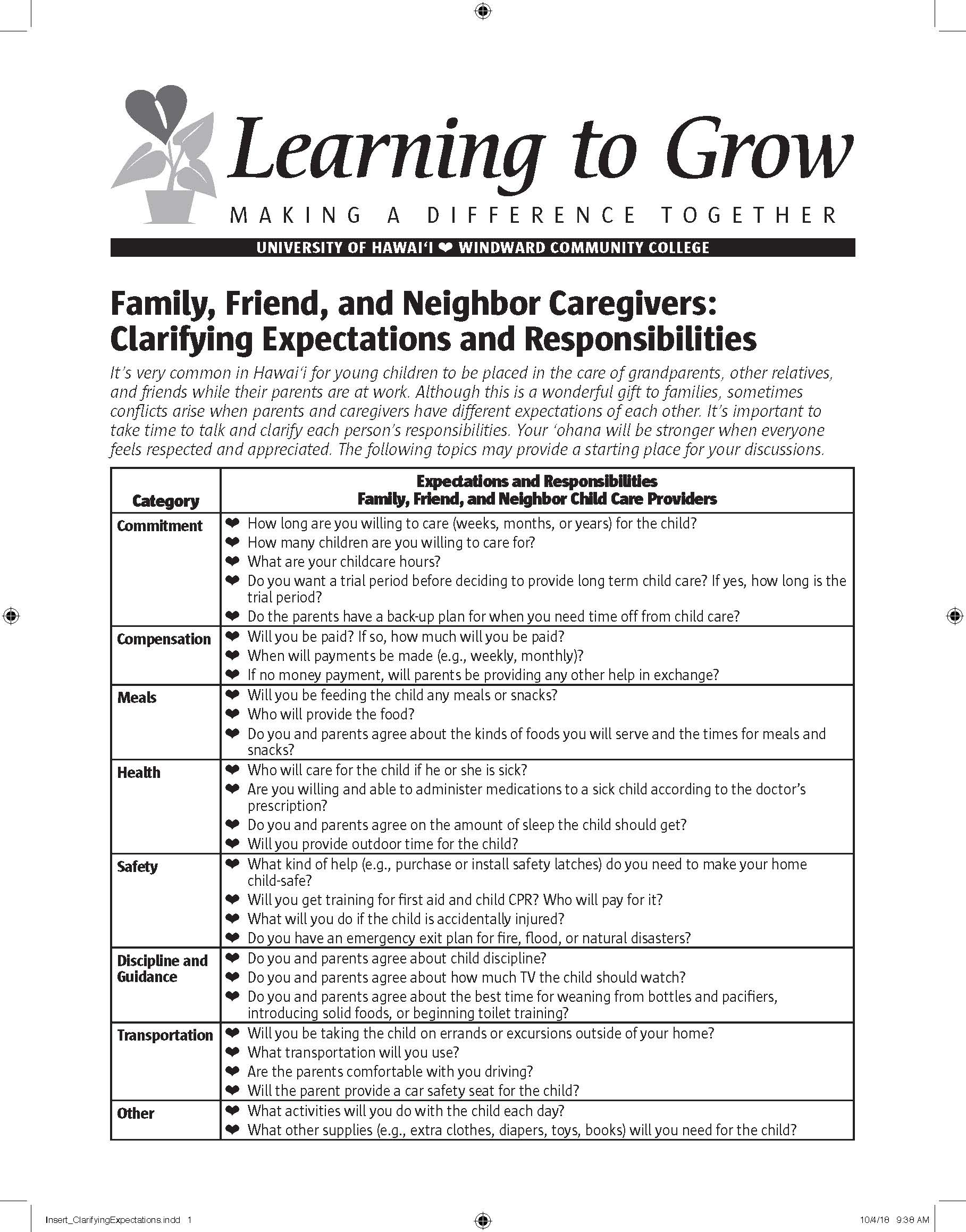
Sometimes conflicts arise when parents and caregivers have different expectations of each other. The following topics may provide a starting place for discussions.
FACEBOOK SHARE ICON.
|
PDF Food Safety and Your Child - June 2016 FFN Newsletter View
|

This newsletter will provide you with food safety tips for infants, toddlers, and preschoolers.
FACEBOOK SHARE ICON.
|
PDF Fostering a Growth Mindset with Appropriate Praise View
|

This newsletter will focus on strategies, tips and examples for promoting a growth mindset in young children by: using process-praise, paying attention to what children are doing, and using questioning strategies.
FACEBOOK SHARE ICON.
|
PDF Fostering Children's Mathematical Skills Through Everyday Experiences and Play-QCC March Newsletter View
|

Math experiences in the early childhood years can greatly increase the likelihood of success in mathematics.
FACEBOOK SHARE ICON.
|
PDF Fostering Dramatic Play View
|

In this newsletter, we will present tips for setting up the environment, choosing materials, and facilitating dramatic play.
FACEBOOK SHARE ICON.
|
PDF Getting Ready for Kindergarten Book View
|

To assist with the Kindergarten transition process, the Center on the Family has produced Getting Ready for Kindergarten, a locally-written children’s book about beginning kindergarten. In this beautifully illustrated book, Mary Ann and Eric Nemoto tell the story of Leilani, who is cared for by her grandmother, and Tino, who is in preschool, as they prepare for kindergarten. Getting Ready for Kindergarten shows parents and teachers working together to provide Leilani and Tino with a positive start to kindergarten.
FACEBOOK SHARE ICON.
|
PDF Getting to Know Your Child - November 2016 Newsletter View
|
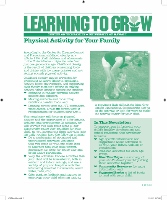
This newsletter will focus on understanding your child’s temperament. It also provides age-appropriate activities you can do with your child, with modifications to fit his temperament.
FACEBOOK SHARE ICON.
|
PDF Getting to Know Your Child September 2012 Newsletter View
|
|
|
PDF Got Containers? (April 2022 Newsletter) View
|

In this newsletter we will provide examples of how familiar containers can support the learning of concepts, deepen critical thinking, and promote creative thinking at each age level -- infants, toddlers, and preschoolers.
FACEBOOK SHARE ICON.
|
PDF Got Containers? Let's Learn! (April 2022 QCC Newsletter) View
|
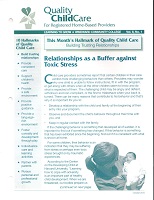
In this newsletter we will provide examples of how familiar containers can support the learning of concepts, deepen critical thinking, and promote creative thinking at each age level – infants, toddlers, and preschoolers. We will also present examples of questions you can pose to spark children’s interest and curiosity to further investigate containers.
FACEBOOK SHARE ICON.
|
PDF Healthy Financial Decisions View
|
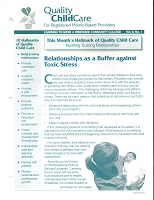
This newsletter will present some business tips to help you make healthy financial decisions for your program. In addition, we’ll share inexpensive activity ideas for infants, toddlers, and preschoolers.
FACEBOOK SHARE ICON.
|
PDF Healthy Relationships (April 2021 Newsletter) View
|

This newsletter will discuss brain and self-regulation development at each age level – infant, toddler and preschooler, to help you focus on the whole-child rather than the child’s behavior to build healthy relationships, brains and behaviors
FACEBOOK SHARE ICON.
|
PDF Healthy Relationships (April 2021 QCC Newsletter) View
|

This newsletter will discuss brain development to help you focus on the whole-child rather than the child’s behavior – to build healthy relationships, and help the child develop skills and confidence to be a critical thinker who makes positive choices.
FACEBOOK SHARE ICON.
|
PDF Healthy Screen Time Habits (May 2021 Newsletter) View
|

This month’s newsletter will focus on some of the following tips from the AAP that encourage caregivers in the responsible use of electronic media in a way that supports their child’s healthy development.
FACEBOOK SHARE ICON.
|
PDF Help Your Child’s Brain Develop at its Best (Nov 2022 Newsletter) View
|
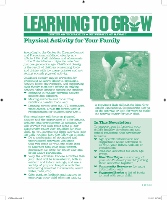
In this newsletter, we will discuss Dr. Medina’s parenting advice in greater detail, and highlight some of his practical tips for each age level -- infants, toddlers and preschoolers. We will also present ideas for activities that will build the brain of children, as well as adults.
FACEBOOK SHARE ICON.
|
PDF Helping All Children Thrive View
|

This newsletter will share helpful strategies for creating an environment with a proactive approach to modify the environment and adapt materials for infants, toddlers, and preschoolers at different levels of development.
FACEBOOK SHARE ICON.
|
PDF Helping All Children Thrive View
|

This newsletter will share strategies you can use to create an accessible play area; adapt materials in your program, such as blocks, dramatic play, art, and books; and individualize care
FACEBOOK SHARE ICON.
|
PDF Helping Children Feel Safe (April 2020 Newsletter) View
|
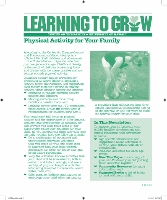
In this newsletter, we will discuss supportive strategies for each age group of infants, toddlers, and preschoolers.
FACEBOOK SHARE ICON.
|
PDF Helping Your Child Cope with Stress - October 2014 Newsletter View
|

The way families handle stress and model how to cope with challenges affects how a child grows and develops. This newsletter gives tips on how you can support your child and gives age-specific activities for your infant, toddler, and preschooler.
FACEBOOK SHARE ICON.
|
PDF Hickory Dickory Dock: Nursery Rhymes Rock! (R.O.C.) View
|

In this newsletter, we’ll expand on the following three important skills that children learn when they hear and recite nursery rhymes. In addition, we will present fun and engaging nursery rhyme activities you can do with children at each age level – infants, toddlers and preschoolers – to help them gain these important foundational skills.
FACEBOOK SHARE ICON.
|
PDF Hickory Dickory Dock: Nursery Rhymes Rock! (R.O.C.) View
|
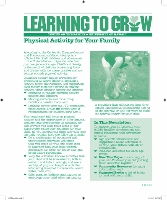
In this newsletter, we’ll expand on the important skills that children learn when they hear and recite nursery rhymes, and present helpful strategies for using nursery rhymes with each age level – infants, toddlers and preschoolers.
FACEBOOK SHARE ICON.
|
PDF How Does Your Garden Grow? (July 2021 Newsletter) View
|
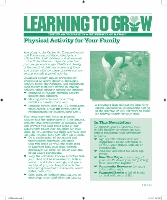
This newsletter will share ideas and activities from Farm to Keiki for infants, toddlers, and preschoolers, including: healthy cooking with children, growing a garden, and eating from Farm to Table.
FACEBOOK SHARE ICON.
|
PDF How Young is Too Young: Using Technology Responsibility February 2013 Newsletter View
|

This newsletter focuses on recommendations for responsible use of electronic media in supporting a child's healthy development.
FACEBOOK SHARE ICON.
|
PDF How Young is Too Young: Using Technology Responsibly - January 2016 Newsletter View
|

This month's newsletter will focus on some of the following key messages from the American Academy of Pediatrics Media Research Symposium that encourage parents in the responsible use of electronic media in a way that supports their child's healthy development.
FACEBOOK SHARE ICON.
|
PDF I Am Who I Am Because of You - March 2016 Newsletter View
|

This newsletter will focus on suggested ways you can introduce and support your child’s learning about her cultural heritage. Activities that incorporate cultural traditions and practices that you can do with your infant, toddler, and preschooler are also included.
FACEBOOK SHARE ICON.
|
PDF Immunize Your Child Against Common Childhood Diseases - November 2014 Newsletter View
|

This newsletter addresses information provided by the Center for Disease Control on a few common vaccine-preventable diseases in young children, as well as tips on making immunization visits more positive for your child.
FACEBOOK SHARE ICON.
|
PDF Indoor Active Movement and Nature-based Play Activities View
|
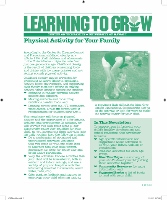
This newsletter will provide you with some active movement and nature-based play ideas to do in your indoor space that you can use with infants, toddlers, and preschoolers.
FACEBOOK SHARE ICON.
|
PDF Indoor Movement and Nature Activities View
|

Wouldn’t you love to bottle up the benefits of playing outdoors and bring it indoors on rainy days? There are ways to bring some of the elements of outdoor play to keiki through intentional planning and creativity. This newsletter will provide you with indoor active movement and nature-based play activity ideas for infants, toddlers, and preschoolers.
FACEBOOK SHARE ICON.
|
PDF Inspiring Young Children's Play Through Loose Parts - December 2018 Newsletter View
|

This newsletter will discuss examples of loose parts that you can include in your child's play setting and tips for using these materials effectively with infants, toddlers, and preschoolers.
FACEBOOK SHARE ICON.
|
PDF Intentional Planning - March 2019 QCC Newsletter View
|

This newsletter will outline the steps for intentionally planning learning activities to engage young children, and will highlight the importance of setting goals for each child, the benefits of using a lesson plan, and key ideas to keep in mind when planning.
FACEBOOK SHARE ICON.
|
PDF Keep Fairy Tales N.E.A.R. View
|

In this newsletter, we will further discuss how emotional intelligence develops, and offer tips for using fairy tales to nurture emotional intelligence at each age level – infants, toddlers and preschoolers, using the acronym N.E.A.R. – as a reminder to keep fairy tales near.
FACEBOOK SHARE ICON.
|
PDF Keep Fairy Tales N.E.A.R. View
|

In this newsletter, we will further discuss how emotional intelligence develops, and offer tips for using fairy tales to nurture emotional intelligence at each age level – infants, toddlers and preschoolers, using the acronym N.E.A.R. -- to remind you to keep fairy tales near.
FACEBOOK SHARE ICON.
|
PDF Keeping Art Activities Safe View
|

In this newsletter, we’ll show you: Labels to look for when purchasing art materials, Information from Penn State Better Kid Care on the health and safety basics of providing art experiences, Insert: Art materials for infants and toddlers: What’s safe and what’s not.
FACEBOOK SHARE ICON.
|
PDF Keeping it Clean and Green (April 2023 Newsletter) View
|

Removing germs, pests, dust, and dirt through regular cleaning, sanitizing and disinfecting is important for keeping your child healthy and safe. This newsletter will present information that will help you make the best choices for your home.
FACEBOOK SHARE ICON.
|
PDF Keeping it Clean and Green (QCC April 2023 Newsletter) View
|

This newsletter will present information that will help you make the best choices for your program. We will highlight information about chemical fragrances, plastics and plastic toys, and tools for cleaning, sanitizing, and disinfecting.
FACEBOOK SHARE ICON.
|
PDF Keeping Your Brain Healthy & Sharp (Nov 2022 QCC Newsletter) View
|

Whether you are a younger adult or an older adult, practicing these valuable tips will keep your brain sharp and help it to work at its best, while also reducing chronic stress, burnout, and allowing you to engage more effectively with the children in your care.
FACEBOOK SHARE ICON.
|
PDF Keeping Your Home Safe for Your Child to Explore - December 2014 Newsletter View
|

This newsletter provides additional ideas on how to childproof your home for each age group and suggests safe activities you can do with your child at home.
FACEBOOK SHARE ICON.
|
PDF Keeping Your Young Child Safe - June 2014 Newsletter View
|

This newsletter will focus on safety issues that need to be paid close attention to for infants, toddlers, and preschoolers. In addition, age appropriate activities are also included.
FACEBOOK SHARE ICON.
|
PDF Keeping Your Young Child Safe-February 2017 View
|

This newsletter will focus on safety issues that need to be addressed for infants, toddlers, and preschoolers.
FACEBOOK SHARE ICON.
|
PDF Kids in the Kitchen - Feb 2019 Newsletter View
|

In this newsletter, tips on how to do cooking activities with children, including safety considerations, will be shared. Also included are some fun recipes to try!
FACEBOOK SHARE ICON.
|
PDF Kids in the Kitchen - Feb 2019 QCC Newsletter View
|

In this newsletter, tips on how to do cooking activities with children, including safety considerations, will be shared. We will also include some fun recipes to try!
FACEBOOK SHARE ICON.
|
PDF Language Development in the Media Age- QCC February Newsletter View
|

In this newsletter we will discuss ways to use media that support children's language development.
FACEBOOK SHARE ICON.
|
PDF Learning about Math Everyday October 2012 Newsletter View
|
|
|
PDF Learning STEM through Water Activities (Feb 2023 QCC Newsletter) View
|

This newsletter will highlight STEM learning through water activities -- something familiar and accessible for infants, toddlers and preschoolers.
FACEBOOK SHARE ICON.
|
PDF Learning STEM through Water Activities (February 2023 Newsletter) View
|

This newsletter will highlight STEM learning through water activities -- something familiar and accessible for infants, toddlers and preschoolers.
FACEBOOK SHARE ICON.
|
PDF Learning to Grow Developmental Guidelines and Early Learning Activities for Infants and Toddlers View
|

Learning to Grow Developmental Guidelines and Early Learning Activities for Infants and Toddlers book provides information on the growth and development of young children (birth to 48 months) and includes samples of simple-to-do activities that can be done with infants and toddlers to support their development. A "How This Helps" section for each activity describes the ways in which a child's development is influenced by engaging in the activity. To order this book, please use the Learning to Grow order form LTG activity books order form_Jan2016
FACEBOOK SHARE ICON.
|
PDF Learning to Grow Developomental Guidelines and Early Learning Activities for Preschoolers View
|

Learning to Grow Developmental Guidelines and Early Learning Activities for Young Preschoolers book identifies developmental guidelines for children (birth to 48 months) and provides examples of typical behaviors that illustrate the guidelines. It also includes a variety of activities that parents & care givers can do with children ages 36 to 48 months to promote early learning and skill development. To order this book, please use the Learning to Grow order form LTG activity books order form_Jan2016
FACEBOOK SHARE ICON.
|
PDF License-Exempt Providers: Health and Safety Cover Sheet View
|
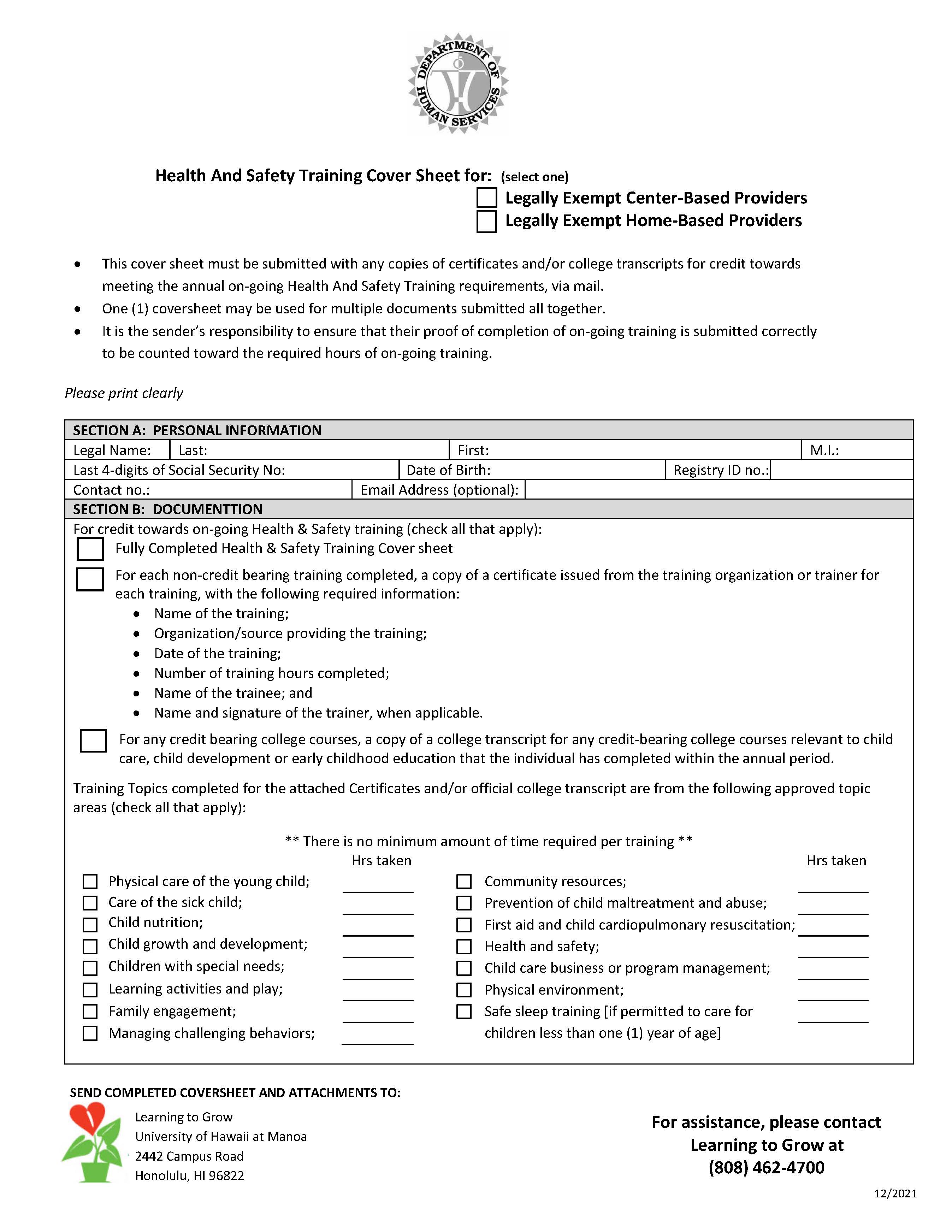
For License-Exempt Providers: This cover sheet must be submitted with any copies of certificates and/or college transcripts for credit towards meeting the annual DHS on-going Health and Safety Training requirements.
FACEBOOK SHARE ICON.
|
PDF Loose Parts Play - December 2018 QCC Newsletter View
|

This newsletter will discuss how to facilitate loose parts play with infants, toddlers, and preschoolers. Examples that you can include in your child care environment are provided with tips for using these materials effectively.
FACEBOOK SHARE ICON.
|
PDF Maintaining Children's Health and Safety When You Have Pets - QCC Newsletter View
|

In this newsletter, we will use the information from standards to focus on risk management in child care with pets and how to keep parents informed.
FACEBOOK SHARE ICON.
|
PDF Making Technology Work for You (QCC May 2021 Newsletter) View
|

We’ll focus on updating business practices in this newsletter: electronic forms and payments, and virtual communication.
FACEBOOK SHARE ICON.
|
PDF Managing Expectations with Your Child Care Provider - November 2018 Newsletter View
|

This newsletter will discuss typical issues that might need to be addressed when a family member or friend takes on the caregiving responsibility for your child. We’ll also present strategies and tips for building understanding between parents and care providers as the child grows from infants, to toddlers and preschoolers.
FACEBOOK SHARE ICON.
|
PDF Managing Job Stress View
|

This newsletter will discuss some of the ways child care providers can buffer stress and become resilient in the face of the challenges of this work.
FACEBOOK SHARE ICON.
|
PDF Math in Everyday Activities View
|

In this newsletter, we will share ideas to help infants, toddlers, and preschoolers develop math skills through everyday routine activities.
FACEBOOK SHARE ICON.
|
PDF Math in Everyday Activities View
|

In this newsletter, we will share ideas to help infants, toddlers, and preschoolers develop number sense, shape recognition, and sorting skills through everyday routine activities.
FACEBOOK SHARE ICON.
|
PDF Math is Everywhere (November 2020 QCC Newsletter) View
|
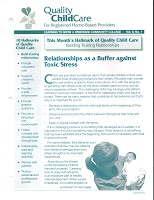
In this newsletter, we will discuss activities that promote the learning of shapes and spatial relationships for infants, toddlers and preschoolers
FACEBOOK SHARE ICON.
|
PDF Math is for Everyone! (November 2020 newsletter) View
|

In this newsletter, we will discuss activities that promote the learning of shapes and spatial relationships at each age level – infants, toddlers and preschoolers.
FACEBOOK SHARE ICON.
|
PDF Middle Ear Infection, Hearing, and Language Development May 2020 Newsletter View
|

In this newsletter, we will present information on how language develops at each age level – infants, toddlers and preschoolers, and how a mild or moderate hearing loss can affect this development. In addition, we will present tips for minimizing ear infections, as well as strategies to promote language development in hearing children as well as those with a hearing loss.
FACEBOOK SHARE ICON.
|
PDF Middle Ear Infection, Hearing, and Language Development May 2020 QCC Newsletter View
|

In this newsletter, we will present information on how
language develops at each age level – infants, toddlers and
preschoolers, and how a mild or moderate hearing loss can
affect this development. In addition, we will present tips
for minimizing ear infections, as well as strategies to
promote language development in hearing children as
well as those with a hearing loss.
FACEBOOK SHARE ICON.
|
PDF National Accreditation for Family Child Care Providers - QCC April 2018 Newsletter View
|

In this newsletter, we will provide the following information about NAFCC accreditation: Purpose, Philosophy, Content Areas of the Quality Standards, and Self-Assessment Process.
FACEBOOK SHARE ICON.
|
PDF Navigating Power Struggles View
|

This newsletter will share helpful strategies for navigating power struggles with infants, toddlers and preschoolers.
FACEBOOK SHARE ICON.
|
PDF Navigating Power Struggles View
|

This newsletter will share helpful strategies for navigating power struggles through using visual supports, providing two GREAT choices, and diffusing a power struggle with empathy.
FACEBOOK SHARE ICON.
|
PDF Nurturing Young Children's Curiosity and Creativity - April 2016 Newsletter View
|

This newsletter will talk about ways that you can encourage and support your child's curiosity and creativity.
FACEBOOK SHARE ICON.
|
PDF Nutrition - Learn, Grow, and Cook (QCC July 2021 Newsletter) View
|

By using Farm to Keiki as a guide to provide healthy nutrition practices in your child care program, you can successfully improve the health of all Hawai‘i’s children. This newsletter will share ideas and activities for infants, toddlers, and preschoolers, including: healthy cooking with children, growing a garden, and eating from Farm to Table.
FACEBOOK SHARE ICON.
|
PDF Outdoor Activities for Young Children - January 2020 Newsletter View
|

This newsletter will discuss age-appropriate outdoor materials and activities as well as safety precautions for infants, toddlers, and preschoolers.
FACEBOOK SHARE ICON.
|
PDF Outdoor Activities for Young Children - January 2020 QCC Newsletter View
|

This newsletter will discuss age-appropriate outdoor materials and activities, as well as safety precautions for infants, toddlers, and preschoolers.
FACEBOOK SHARE ICON.
|
PDF Outdoor Activities with Your Child January 2013 Newsletter View
|
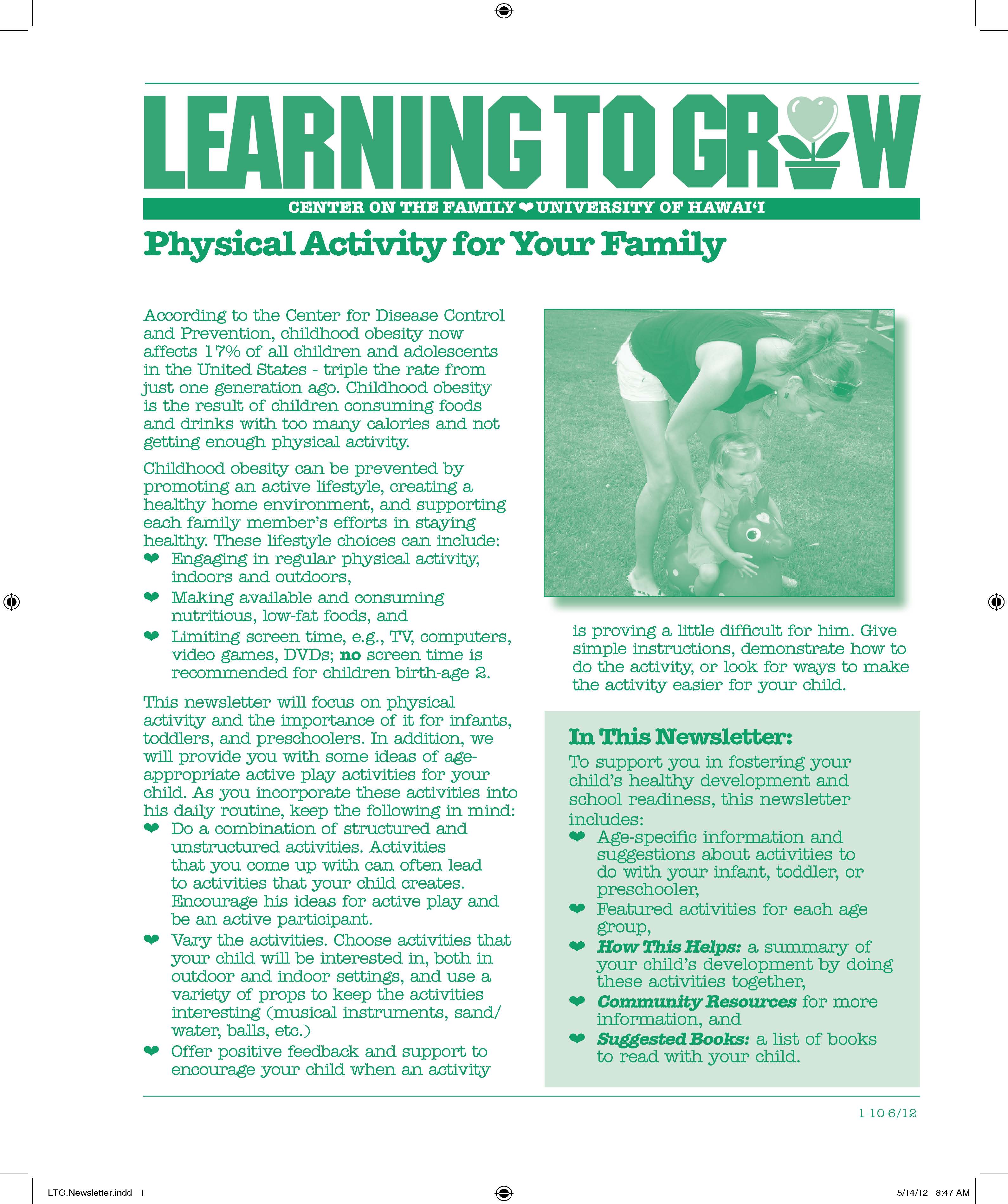
This newsletter focuses on outdoor play activities for you do to with your child.
FACEBOOK SHARE ICON.
|
PDF Planning Activities with the 4E's (Nov 2021 QCC Newsletter) View
|

In this newsletter, we will discuss steps for lesson planning while keeping the 4 E’s in mind with each age level – infants, toddlers and preschoolers.
FACEBOOK SHARE ICON.
|
PDF Planning Daily Activities to Engage Young Children - March 2019 Newsletter View
|

In this newsletter, we will discuss the benefits of planning for children, and give you guidelines for planning rich experiences and activities for your child at each age level – infants, toddlers, and preschoolers.
FACEBOOK SHARE ICON.
|
PDF Play during a Pandemic (December 2020 newsletter) View
|

This newsletter will discuss ways to support your child’s play as a way to get you thinking about how to balance safety, health, and children’s growth and development.
FACEBOOK SHARE ICON.
|
PDF Play during a Pandemic (QCC December 2020 newsletter) View
|

This newsletter will discuss strategies for arranging the environment, creating individual activity bins, and implementing activities with infants, toddlers, and preschoolers as a way to get you thinking about how to balance safety, health, and children’s growth and development.
FACEBOOK SHARE ICON.
|
PDF Positive Guidance Strategy Redirection - January 2018 Newsletter View
|

In this newsletter, we will focus on the positive guidance strategy of redirection and offer tips and examples for using this strategy with infants, toddlers, and preschoolers.
FACEBOOK SHARE ICON.
|
PDF Promoting Healthy Dental Care - May 2016 Newsletter View
|

This newsletter provides dental care information for each age group along with activities you can do with your child to help encourage healthy dental habits.
FACEBOOK SHARE ICON.
|
PDF Promoting Healthy Emotional Development through Routines View
|

This newsletter is filled with practical ideas on establishing routines with your child and age-appropriate activities that you can do at home to promote a healthy emotional growth.
FACEBOOK SHARE ICON.
|
PDF Quality Producer View
|

Raising a School-Ready Child will provide you with ideas on how to engage young children, especially 3-and 4-year olds, in everyday activities that help them develop the characteristics, positive behaviors, and skills that lead to success at home, school, work, and in life.
FACEBOOK SHARE ICON.
|
PDF Raising a Reader (March 2022 Newsletter) View
|
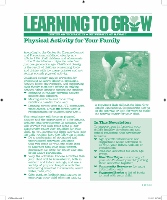
In this newsletter, we will discuss the developmental progression of phonological awareness and alphabet knowledge. We will also share ideas to integrate phonological awareness and alphabet knowledge into daily experiences for infants, toddlers and preschoolers.
FACEBOOK SHARE ICON.
|
PDF Raising a School-Ready Child View
|

Raising A School-Ready Child: A Family Guide provides useful tips to help parents, family service providers and educators prepare youngsters for school success. The publication discusses the essential role that parents play in helping children develop the characteristics, positive behaviors and skills that are needed for success at school, home, work, and in life. These traits are associated with the General Learner Outcomes (GLOs) that serve as the basis for evaluating student performance at all grade levels, and in all academic disciplines in Hawai‘i ’s public schools. Raising A School-Ready Child describes the home-to-school learning continuum, with examples of everyday activities that parents can use to support their children’s early learning, and to promote school readiness.
FACEBOOK SHARE ICON.
|
PDF Raising Future Readers (QCC March 2022 Newsletter) View
|
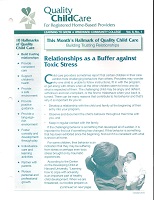
In this newsletter, we will discuss the developmental progression of phonological awareness and alphabet knowledge. We will also share ideas to integrate phonological awareness and alphabet knowledge into daily experiences for infants, toddlers and preschoolers.
FACEBOOK SHARE ICON.
|
PDF Re-evaluating your Emergency Plan View
|

This newsletter will share ways to re-evaluate your plan on an ongoing basis, paying special attention to supporting all children, communication with families, and emergency supplies and records. In addition, we’ll present ways to teach keiki about safe practices during an emergency.
FACEBOOK SHARE ICON.
|
PDF Reading with Your Young Child - February 2015 Newsletter View
|

This newsletter will provide reading tips for you to use with your infant, toddler, or preschooler as well as suggest reading activities that you can do with your child at home.
FACEBOOK SHARE ICON.
|
PDF Relationships as a Buffer against Toxic Stress - November 2015 QCC Newsletter View
|

In this newsletter, we’ll describe what is known about how toxic stress brought on by multiple Adverse Childhood Experiences (ACES) affects children’s developing brains and bodies. We’ll conclude with the powerful positive impact your relationships with children have that buffers the potential damage.
FACEBOOK SHARE ICON.
|
PDF Resources for Families COVID-19 View
|

The Hawaii Executive Office on Early Learning has curated a list of resources that families may find helpful during this extensive time at home with their children
FACEBOOK SHARE ICON.
|
PDF Say Okay to Risky Play View
|

This newsletter will delve into risky play – allowing you to reflect on your comfort level to encourage risky play and explore activity ideas of this type of play for all age levels.
FACEBOOK SHARE ICON.
|
PDF Say Okay to Risky Play View
|

This newsletter will define the 6 categories of risky play, describe how to support and encourage young children to engage in risky play and provide safety precautions.
FACEBOOK SHARE ICON.
|
PDF Scientific Thinking: Building on Your Child's Natural Curiosity - March 2018 Newsletter View
|

In this newsletter, we will offer tips and suggest activities to promote your child’s scientific thinking at each age level – infants, toddlers and preschoolers.
FACEBOOK SHARE ICON.
|
PDF Self-Directed Learner View
|

Raising a School-Ready Child will provide you with ideas on how to engage young children, especially 3-and 4-year olds, in everyday activities that help them develop the characteristics, positive behaviors, and skills that lead to success at home, school, work, and in life.
FACEBOOK SHARE ICON.
|
PDF Separation Anxiety and Rituals View
|

This newsletter will discuss the importance of developing rituals for young children and will offer examples that you can use to help ease separation anxiety with infants, toddlers and preschoolers.
FACEBOOK SHARE ICON.
|
PDF Serve and Return Interactions Support Brain Development - QCC Nov 2016 Newsletter View
|

In this newsletter, we will focus on one of the significant parent and child care provider behaviors that support children’s brain development: Serve and Return Interactions.
FACEBOOK SHARE ICON.
|
PDF Setting Up and Encouraging Dramatic Play View
|
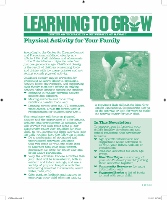
This newsletter will explain what you might see at each age level (infants, toddlers, and preschoolers) as children’s dramatic play develops over time. We will also present tips on how to choose materials and encourage dramatic play.
FACEBOOK SHARE ICON.
|
PDF Show Your Child that He is Important and Loved - September 2014 Newsletter View
|

This newsletter will focus on ways to show your child how important he is to you. It will also include ideas of age-appropriate activities you may enjoy doing together with your child.
FACEBOOK SHARE ICON.
|
PDF Speech and Language Delays (June 2020 QCC Newsletter) View
|

In this newsletter, we will present strategies to help you partner with parents by: being a source of information regarding speech and language development; sharing available resources if a speech or language delay is suspected; working cooperatively to ensure the child receives needed speech and language support.
FACEBOOK SHARE ICON.
|
PDF Speech and Language Development in Young Children (June 2020 Newsletter) View
|

In this newsletter, we will present information to help you track your child’s speech and language development. We will also discuss general speech and language milestones at each age level, and strategies to promote speech and language development in infants, toddlers and preschoolers.
FACEBOOK SHARE ICON.
|
PDF Strategies for Partnering with Families - June 2018 Newsletter View
|

This newsletter will present information on: the Family Partnership Guidelines adopted by the State of Hawaii in 2013 and Strategies for implementing family partnerships.
FACEBOOK SHARE ICON.
|
PDF Support Positive Approaches to Learning Volume III, No. 6 View
|

This newsletter will illuminate important approaches to learning that affect later school success and provide examples of how family child care providers can support chidren's positive approaches to learning.
FACEBOOK SHARE ICON.
|
PDF Supporting Children Through Transitions (December 2022 Newsletter) View
|

This newsletter will discuss ways to support your child’s ability to have successful transitions at each age level — infants, toddlers and preschoolers, and present activity ideas for each age group.
FACEBOOK SHARE ICON.
|
PDF Supporting Children Through Transitions (QCC December 2022 Newsletter) View
|

This newsletter will discuss two other key ways to support young children’s
ability to have successful transitions at each age level – infants, toddlers and
preschoolers, and present activity ideas for each age group.
FACEBOOK SHARE ICON.
|
PDF Supporting Choosy Eaters View
|

This newsletter will present information that will help you support your child’s healthy eating and suggest tips and activities for infants, toddlers, and preschoolers to try new foods.
FACEBOOK SHARE ICON.
|
PDF Supporting Choosy Eaters View
|
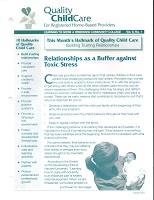
This newsletter will present information that will help you support children’s healthy eating and suggest tips and activities for infants, toddlers, and preschoolers to try new foods.
FACEBOOK SHARE ICON.
|
PDF Suppporting Children's Language and Literacy Development April 2017 View
|

This newsletter will offer tips for communicating with young children and identifying the kinds of interactions and language experiences that support their language and literacy development.
FACEBOOK SHARE ICON.
|
PDF Taking Care of Yourself the Blue Zones Way - July 2018 QCC Newsletter View
|

In this newsletter, we'll introduce the basic longevity and happiness concepts promoted by The Blue Zones Project; which you can incorporate on your own, and into your daily living to: alleviate stress, pursue well-being, and find greater happiness in your profession.
FACEBOOK SHARE ICON.
|
PDF Teach Children Skills for Making Friends (July 2022 QCC Newsletter) View
|

In this newsletter, we will discuss three recognized strategies that help
children learn these foundational skills:
- Playing games together
- Increasing awareness of social and
emotional cues
- Structuring the learning environment
and daily activities
FACEBOOK SHARE ICON.
|
PDF Teach Children the Skills Needed to Make Friends (July 2022 Newsletter) View
|
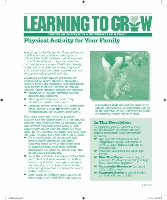
In this newsletter, we will introduce some games to play with young children. We will also discuss how friendships develop at each age level -- infants, toddlers and preschoolers, and present ideas that you can do to help your child learn the skills necessary to make and maintain friends.
FACEBOOK SHARE ICON.
|
PDF Teaching Young Children About Hygiene - June 2018 Newsletter View
|

In this newsletter, we will discuss hand washing and other good hygiene habits for each age group - infants, toddlers, and preschoolers - and offer tips for teaching and incorporating them into your child's everyday routine.
FACEBOOK SHARE ICON.
|
PDF The Building Blocks of Fine Motor Skills View
|

In this newsletter, we will discuss the building blocks of fine motor skills as well as share activities that support the fine motor development of infants, toddlers and preschoolers
FACEBOOK SHARE ICON.
|
PDF The Building Blocks of Fine Motor Skills View
|
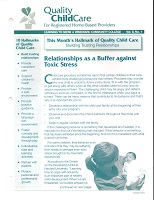
In this newsletter, we will discuss four of the building blocks of fine motor skills as well as share activities that support their development at each age level- infants, toddlers and preschoolers.
FACEBOOK SHARE ICON.
|
PDF The Environment as the 3rd Teacher View
|

This newsletter will share helpful strategies for creating and using visual supports (photos, drawings, objects, gestures, and print) that will guide you in using your environment as the third teacher.
FACEBOOK SHARE ICON.
|
PDF The Magic of Oral Storytelling (Jan 2021 Newsletter) View
|

In this newsletter, we will discuss ways to make storytelling come alive! We will also share how storytelling can be integrated into daily experiences for infants, toddlers and preschoolers.
FACEBOOK SHARE ICON.
|
PDF The Magic of Oral Storytelling (QCC Jan 2021 Newsletter) View
|
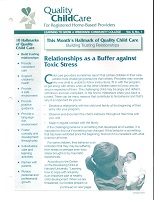
In this newsletter, we will discuss ways ways to make storytelling come alive! We will also share how storytelling can be integrated into daily experiences for infants, toddlers and preschoolers.
FACEBOOK SHARE ICON.
|
PDF The Power of Ohana View
|

This newsletter will highlight some examples of the six traits to strengthen your ‘ohana at each age level—infants, toddlers, and preschoolers.
FACEBOOK SHARE ICON.
|
PDF The Science of Reading View
|

. In this newsletter, we will introduce some of the Science of Reading strategies to help support children’s language comprehension at each age level -- infants, toddlers, and preschoolers.
FACEBOOK SHARE ICON.
|
PDF The Wonder of Puppets - February 2020 Newsletter View
|

In this newsletter, we will discuss specific ways puppets promote children’s growth and development at each age level -- infants, toddlers and preschoolers, and present tips and ideas for using puppets with each of these age groups.
FACEBOOK SHARE ICON.
|
PDF The Wonder of Puppets - QCC February 2020 Newsletter View
|

In this newsletter, we will discuss specific ways puppets promote children’s growth and development at each age level -- infants, toddlers and preschoolers, and present tips and ideas for using puppets with each of these age groups.
FACEBOOK SHARE ICON.
|
PDF Tips for Sharing a Developmental Concern with Families (May 2022 QCC Newsletter) View
|

In this newsletter, we will share tips from the Extension’s article as well as share early
intervention programs to familiarize you with resources so that you can present that information to families.
FACEBOOK SHARE ICON.
|
PDF Toys: Safety and What to Look For View
|

In this newsletter, we will offer tips and questions to ask yourself when selecting a toy for each age level – infants, toddlers and preschoolers.
FACEBOOK SHARE ICON.
|
PDF Understanding Autism View
|

This month's newsletter Understanding Autism will feature information to help you support children with autism.
|
PDF Understanding Sleep (June 2021 Newsletter) View
|

In this newsletter, we will discuss daytime activities that promote healthy sleep in young
children and help them sleep better at night. We will also present strategies to help you establish healthy sleep habits for your child and help you get on track to more restful nights of your own.
FACEBOOK SHARE ICON.
|
PDF Understanding Sleep (QCC June 2021 Newsletter) View
|

In this newsletter, we will discuss daytime activities that promote healthy sleep in young
children and help them sleep better at night. We will also discuss the importance of
sleep for adults and ways we can get more of it.
FACEBOOK SHARE ICON.
|
PDF Using Math Talk with Your Young Child (July 2018 Newsletter) View
|

In this newsletter, we will discuss activities that promote the learning of math concepts at each age level - infants, toddlers and preschoolers - and offer tips and examples for using "math talk" to increase your child's mathematical understanding.
FACEBOOK SHARE ICON.
|
PDF Using Positive Guidance to Prepare Children for School View
|

This newsletter discusses the importance of positive guidance for developing social skills, self-regulation and cooperation; all important skills that help to prepare young children to enter school. Examples of how positive guidance is used with different age groups are presented.
FACEBOOK SHARE ICON.
|
PDF Using Positive Guidance with Your Child January 2014 Newsletter View
|

Newsletter that includes information to support you in guiding your child's behavior.
FACEBOOK SHARE ICON.
|
PDF Using Positive Guidance with Your Young Child January 2017 View
|

Infants, toddlers, and preschoolers behave and communicate differently. Positive guidance for each age group is different.
|
PDF Using Praise Effectively View
|

This newsletter will discuss examples of using specific process-oriented praise, and will present strategies and tips for using praise effectively.
FACEBOOK SHARE ICON.
|
PDF Using Redirection Techniques with Your Young Child - January 2015 newsletter View
|

This newsletter will present some common behaviors you may see in your infant, toddler, and preschooler, ways to support and address their behavior, including ways to redirect your child’s attention in various situations
FACEBOOK SHARE ICON.
|
PDF Using Serve and Return Interactions with Your Child View
|

This newsletter will address the important role that you play in your child’s brain development, and offer strategies and tips for increasing serve and return opportunities with your child.
FACEBOOK SHARE ICON.
|
PDF Using the Science of Reading Strategies with Your Keiki View
|
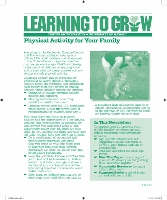
In this newsletter, we will introduce some of the Science of Reading strategies to support your child’s language comprehension at each age level -- infants, toddlers, and preschoolers.
FACEBOOK SHARE ICON.
|
PDF Using Visual Supports for Positive Behavior View
|

In this newsletter, we will share helpful strategies for creating and using visual supports that will support positive behavior when dealing with common, but sometimes challenging developmental milestones for infants (separation anxiety), toddlers (tantrums), and preschoolers (mastering self-help skills).
FACEBOOK SHARE ICON.
|
PDF We All Make Mistakes Book View
|

We All Make Mistakes is a story of events that occur throughout a day in a classroom with students and their teacher. We All Make Mistakes shares a message to children that it is okay to make mistakes but taking responsibility for their mistake and resolving it are the important lessons to learn. To order this book, use the Learning to Grow order form LTG activity books order form_Jan2016
FACEBOOK SHARE ICON.
|
PDF We All Need Somebody to Lean On (July 2020 Newsletter) View
|

This newsletter will discuss ways to support children’s developing social skills at each age level — infants, toddlers and preschoolers, and present activity ideas for each age group.
FACEBOOK SHARE ICON.
|
PDF We All Need Somebody to Lean On (July 2020 QCC Newsletter) View
|

This newsletter will discuss ways you can build your social support, engage families to connect with one another, and support children's developing social skills.
FACEBOOK SHARE ICON.
|
PDF What Makes a Family Child Care a Profession? Vol. III No. 8 View
|

In this newsletter, we’ll explore the qualities that define family child care as a bona fide profession and encourages providers to reflect on what they can do to create a professional atmosphere.
FACEBOOK SHARE ICON.
|
PDF When and How Does Mine Become Ours (March 2023 Newsletter) View
|

In this newsletter we will discuss the 6 stages of play development and strategies to teach young children to take turns at each age level.
FACEBOOK SHARE ICON.
|
PDF When Does Mine Become Ours (QCC March 2023 Newsletter) View
|

In this newsletter we will discuss the 6 stages of social play development and strategies to teach young children to take turns and share
when it is age appropriate.
FACEBOOK SHARE ICON.
|
PDF When Fear Turns into Anxiety View
|
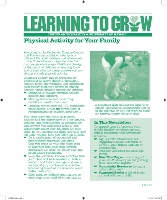
Anxiety becomes a problem when it causes extreme distress or interferes with everyday activities. This newsletter will present information that will help you support the anxious child and suggest coping activities for infants, toddlers, and preschoolers.
FACEBOOK SHARE ICON.
|
PDF When Fear Turns into Anxiety View
|

Anxiety becomes a problem when it causes extreme distress or interferes with everyday activities. This newsletter will present information that will help you identify signs of when anxiety may be a concern and strategies to support children who have persistent anxiety.
FACEBOOK SHARE ICON.
|
PDF Why Empathy Matters - July 2019 Newsletter View
|

This newsletter will discuss some foundational pieces to developing empathy, and will present strategies for at each age level—infants, toddlers and preschoolers.
FACEBOOK SHARE ICON.
|
PDF Why Empathy Matters - July 2019 QCC Newsletter View
|

This newsletter will discuss these foundational pieces to developing empathy, and will present strategies at each age level—infants, toddlers and preschoolers.
FACEBOOK SHARE ICON.
|
PDF Why Play March 2017 View
|

In this newsletter you will learn why play is so important in a child's development and how it helps the brain grow and learn.
FACEBOOK SHARE ICON.
|
PDF Your Growing Child's Small Muscle Development - December 2015 Newsletter View
|
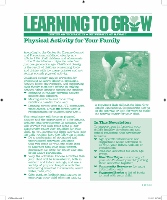
This newsletter will focus on activities you can do with your child that encourages her to use and develop her small muscles, especially those in her fingers and hands.
FACEBOOK SHARE ICON.
|
PDF Your Growing Child’s Large Muscle Physical Development - June 2015 Newsletter View
|

This newsletter provides some information and activities to help you support your child’s large muscle development and have fun with her in the process.
FACEBOOK SHARE ICON.
|
PDF “The Big 5” for Preventing Challenging Behaviors View
|

In this newsletter, we will discuss three of “The Big 5” practices: Use a 5:1 ratio of positive vs. negative attention, teach behavioral expectations, and actively teach social skills; and we will provide examples of what this looks like at each age level – infants, toddlers and preschoolers.
FACEBOOK SHARE ICON.
|
PDF “The Big 5” for Preventing Challenging Behaviors View
|

In this newsletter, we will discuss three of “The Big 5” practices: Use a 5:1 ratio of positive attention, teach behavioral expectations, and actively teach social skills along with examples for each age level.
FACEBOOK SHARE ICON.
|














